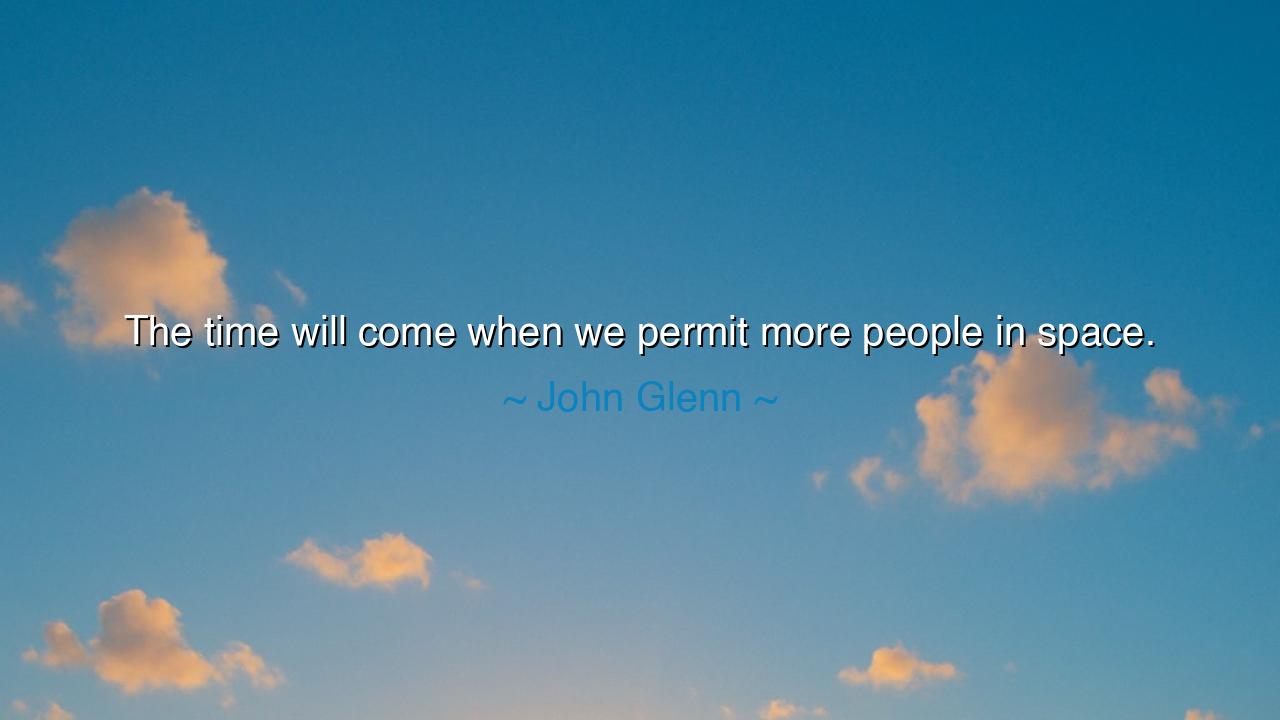
The time will come when we permit more people in space.






Hear the words of John Glenn, first American to orbit the Earth and elder statesman of the stars: “The time will come when we permit more people in space.” This saying is not the idle hope of a dreamer, but the solemn prophecy of one who had seen the heavens firsthand. Glenn, who rode fire into orbit in 1962 and returned decades later as the oldest man to fly among the stars, knew that space was not destined for a chosen few, but for all humanity. His words echo like a promise—that the cosmos shall not remain closed, but will open itself to every generation that dares to ascend.
For what does it mean to permit more people in space? It means that the era of the elite astronaut, chosen from the ranks of the military or the finest scientific minds, will one day give way to the era of the common citizen. It means that space, once the province of governments and superpowers, will be shared with dreamers, builders, teachers, and children. Glenn foresaw a time when the heavens would cease to be the guarded realm of the few and would become the frontier of the many.
Consider the days of his first flight. In the Mercury program, only seven men were chosen, all test pilots, all forged in fire and risk. The dangers were immense, and the trust was great. These men were not only astronauts—they were symbols, embodying the hopes of nations locked in the Cold War. But Glenn, with vision larger than his age, understood that this exclusivity was not the final destiny of humanity. Just as the seas were once crossed by a handful of explorers and later by multitudes, so too would space one day become open to all.
History bears out his prophecy. In our time, private companies have risen—SpaceX, Blue Origin, Virgin Galactic—striving to carry not only astronauts, but also teachers, artists, and ordinary travelers into orbit. The dream of Glenn’s words is slowly becoming reality. Where once space was a battlefield of superpowers, it is now a marketplace of innovators and a horizon for the human family. His statement, spoken decades ago, was not wishful thinking but a seed that is now breaking through the soil.
And yet his words also carry warning. To permit more people in space requires not only technology, but responsibility. Just as the seas were polluted when more ships sailed them, so too space may be endangered by debris, greed, or reckless ambition. The permission Glenn spoke of must be tempered by wisdom, lest the heavens become not a sanctuary of discovery but another arena of exploitation. The prophecy calls not only for access, but for stewardship.
The lesson, O seeker, is this: prepare yourself for a world where frontiers fall. Do not think the stars are forever beyond you. The time will come when ordinary men and women will walk among them, and when that time arrives, the question will not be whether you can go, but whether you are worthy to carry humanity’s banner into the cosmos. Cultivate knowledge, humility, and courage, so that when space opens to all, you may step forward as both explorer and guardian.
So let John Glenn’s words be remembered as both promise and call to duty: “The time will come when we permit more people in space.” That time is dawning even now. And when it fully arrives, may we go not as plunderers, but as pilgrims; not as conquerors, but as caretakers; not as individuals seeking glory, but as humanity seeking its greater destiny. For the stars are not for the few—they are the inheritance of us all.






AAdministratorAdministrator
Welcome, honored guests. Please leave a comment, we will respond soon